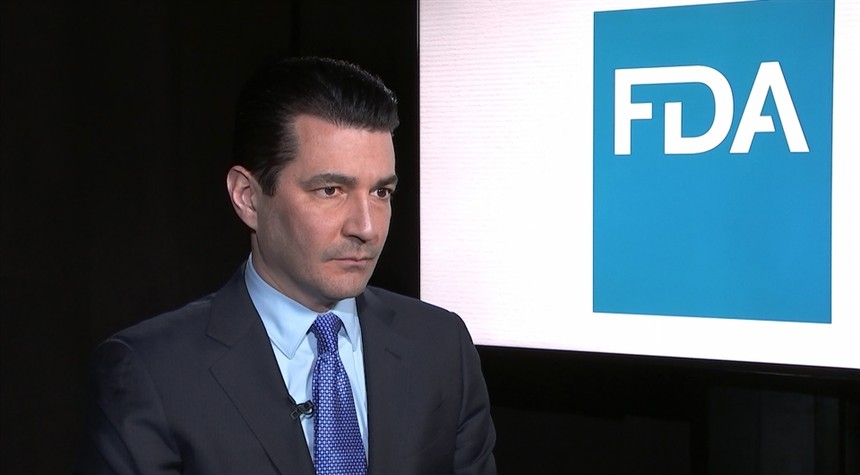In the latest edition of the Twitter Files, journalist Alex Berenson revealed the lengths that people in power went to in order to make sure that the party line was maintained – and Twitter went right along with it.
But, this wasn’t just government censorship. This was a private company with a financial interest in its COVID vaccine wanting itself to be inoculated from criticism.
Dr. Scott Gottleib, who is on the board for the pharmaceutical giant Pfizer, is a former FDA commissioner, and he used his influence to get Twitter to silence dissent against his company’s COVID-19 vaccine.
Among other deeply problematic files, Berenson revealed that, in an August 2021 email, Gottlieb flagged a tweet written by former Trump administration official Dr. Brett Giroir. The email was sent to Twitter’s senior public policy manager Todd O’Boyle. Giroir’s tweet said “It’s now clear #COVID19 natural immunity is superior to #vaccine immunity, by ALOT. There’s no scientific justification for #vax proof if a person had prior infection.”
Berenson broke down just how the tweet ended up getting flagged.
The post was “corrosive,” Gottlieb wrote. He worried it would “end up going viral and driving news coverage.”
[…]
Through Jira, an internal system Twitter used for managing complaints, O’Boyle forwarded Gottlieb’s email to the Twitter “Strategic Response” team. That group was responsible for handling concerns from the company’s most important employees and users.
“Please see this report from the former FDA commissioner,” O’Boyle wrote – failing to mention that Gottlieb was a Pfizer board member with a financial interest in pushing mRNA shots.
A Strategic Response analyst quickly found the tweet did not violate any of the company’s misinformation rules.
Yet Twitter wound up flagging Giroir’s tweet anyway, putting a misleading tag on it and preventing almost anyone from seeing it. It remains tagged even though several large studies have confirmed the truth of Giroir’s words.
In a separate incident, Gottlieb attempted to get flagged a tweet that criticized the need for COVID mitigation efforts to be applied to children, who were (and still largely are) far less susceptible to the virus and its symptoms.
A week later, on Sept. 3, 2021, Gottlieb tried to strike again, complaining to O’Boyle about a tweet from Justin Hart. Hart is a lockdown and Covid vaccine skeptic with more than 100,000 Twitter followers.
“Sticks and stones may break my bones but a viral pathogen with a child mortality rate of <>0% has cost our children nearly three years of schooling,” Hart had written.
Why Gottlieb objected to Hart’s words is not clear, but the Pfizer shot would soon be approved for children 5 to 11, representing another massive market for Pfizer, if parents could be convinced Covid was a real threat to their kids.
O’Boyle referred to “former FDA Commissioner Gottlieb” when he forwarded the report, again ignoring Gottlieb’s current work for Pfizer.
This time, though, Gottlieb’s complaint was so far afield that Twitter refused to act.
That’s two notable times that Gottlieb, who had a financial interest in the vaccines not being questioned, attempted to get the social media company to flag tweets that flew against his financial interest. However, it wasn’t the only time he tried to interfere.
Berenson also explained his own personal battles against Gottlieb – who admitted that he was attempting to using Twitter to censor Berenson and his claims. The journalist had gained fame (or notoriety) on social media for his vaccine skepticism, and his own battles with the social media company and government censorship have been well-documented.
Much like the shot, Berenson had a jab for Pfizer at the end of his piece on the Twitter files.
He is one of seven members of the board’s executive committee and the head of its regulatory and compliance committee, which oversees “compliance with laws, regulations, and internal procedures applicable to pharmaceutical sales and marketing activities.”
Pfizer has a long history of violating drug industry laws and ethics rules. In 2009, it agreed to pay $2.3 billion, the largest health care fraud settlement in American history, for fraudulently marketing several drugs. In 1996, it conducted a clinical trial of an antibiotic in Nigeria in which 11 children died and which became the inspiration for John le Carre’s novel The Constant Gardner.
It remains to be seen if Pfizer will answer for their board member’s actions.

